Can you really live in Thailand on $750 a month?
Yeah, of course you can, but you may not be having the most exciting life. Long term living will definitely have a different feel to the time you visited Phuket for the first time!
There is good news though, if you can get your expenses down to around $750 a month, and you are getting the standard UK pension of 204 pounds per week (currently $1,127), then you’d have over $370 a month left over.
And it’s even better for my American friends, as the average Social Security check payment for retired workers is $1,830. So the average American pensioner would have $1,080 a month spare (and this is before considering any private pensions or 401(k) savings).
So if you are from the UK, on the basic state pension, you’d have about $4,500 a year to put toward the essentials that make life fun.
And if you are from the US, then you’ll have close to $13,000 a year excess! The full Aussie pension is $1064 AUD per fortnight, so about US $17,700 a year. So if you restrict your core costs to $750 a month, you’d have a good US $10,200 over for the year, or about $850 a month.
This extra money could go towards a yearly flight home, Western food, and local trips to see what Thailand has to offer.
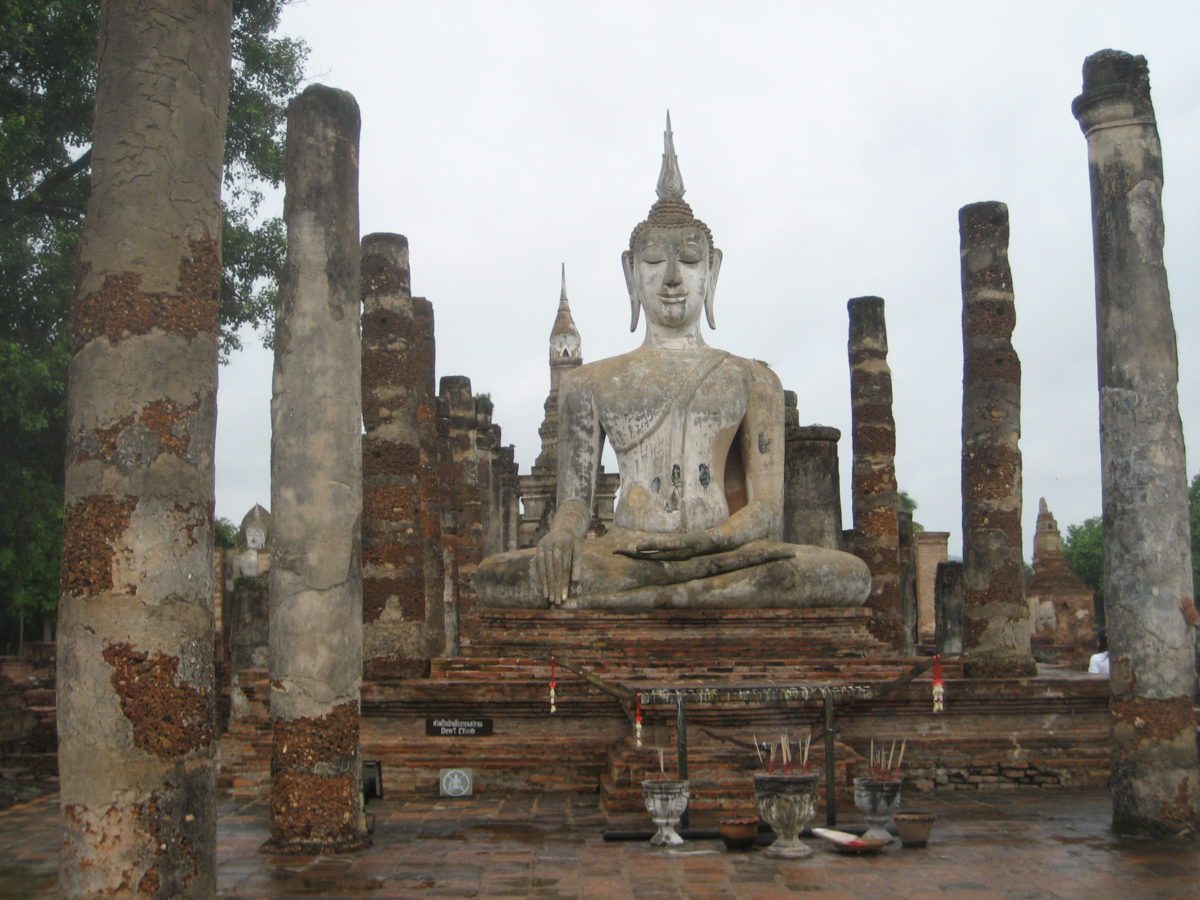
Or maybe you’d prefer to put it towards some short trips to countries that you’ve always dreamed of traveling to, such as Japan and Nepal. These places are pretty cheap to travel to if you make use of the many low-cost airlines that fly out of Thailand.
You may have different uses for the money you’d have spare from your pension, such as treating your girlfriend or having a drink with your friends in the local bars. These can make your day-to-day life much less mundane.
Monthly Budgeting for $750 Living in Thailand
So a monthly budget of $750 in Thailand is just 26,500 Thb! This does not seem like a lot of money at all.
To put it simply, you need to plan things out very carefully, and have good control over your expenses.
Perhaps partaking in the Japanese art of Kakeibo, that is making use of a physical household financial ledger, could prove of use for keeping track of things. I find that writing things down is of great help for those who don’t know where their pennies are disappearing to.
To survive on $750 a month, you are going to have to undergo some initial set-up expenses, such as furniture, crockery, cycles, motorbikes, and the like.
I will delve into them later, but for now, let’s concentrate on the key costs of monthly living once you are here, and have set yourself up.
Core Living Expenses
Apartments / Home
It’s pretty easy to find a nice bungalow or apartment in Thailand for about six to ten thousand Thai baht if you are signing up for a yearly contract.
I find it interesting that a two-bedroom bungalow or Townhouse is often the same price as an apartment. Though there are pros and cons of each type, with renting a bungalow typically being a bit more hands-on than moving into an apartment (which are usually supported by an apartment complex management staff).
When looking for a place to rent, be sure that you are going to pay the official rates for electricity (about 4 bahts a unit). Many places (especially those that offer monthly rentals) like to pad this out to 7 or 8 baht a month (instantly making them an extra 1,000 baht or more).
If you want to cut costs even further, then you may wish into a renting a monthly room – more than liveable fan rooms can be had for as little as 2,000 in many places.
And of course, if budget is not an issue, you can splash out thousands of dollars for a villa overlooking the sea in Phuket.
It is easier than you think to find a place to stay long-term in Thailand. This is because it is a massive market for retirees and digital nomads. This means that there are many agents out there, who will make the process a breeze.
For those who want to search for a place to rent by themselves, I recommend using FaceBook Marketplace (which has a large mixture of agents and private owners).
To do a search on Facebook Marketplace: First, change the location to the area you are interested in. Then do a search for rentals. Finally, filter it by the price that you are looking to pay.
If you are planning to use them, then it can be a good idea to look for a place that has a gym and pool available (very common for even low-cost apartments in Thailand).
If you don’t need these, then you may be able to save a bit of money by renting at a more basic apartment complex, which are often known as Mansions in Thailand.
To give you an idea of the type of apartment complex you can get for this price. Here is my place in Jomtien.
It costs me 7,500 baht per month, which is about $212. It has three pools and a gym, has great management, and is about 300 metres to the beach.
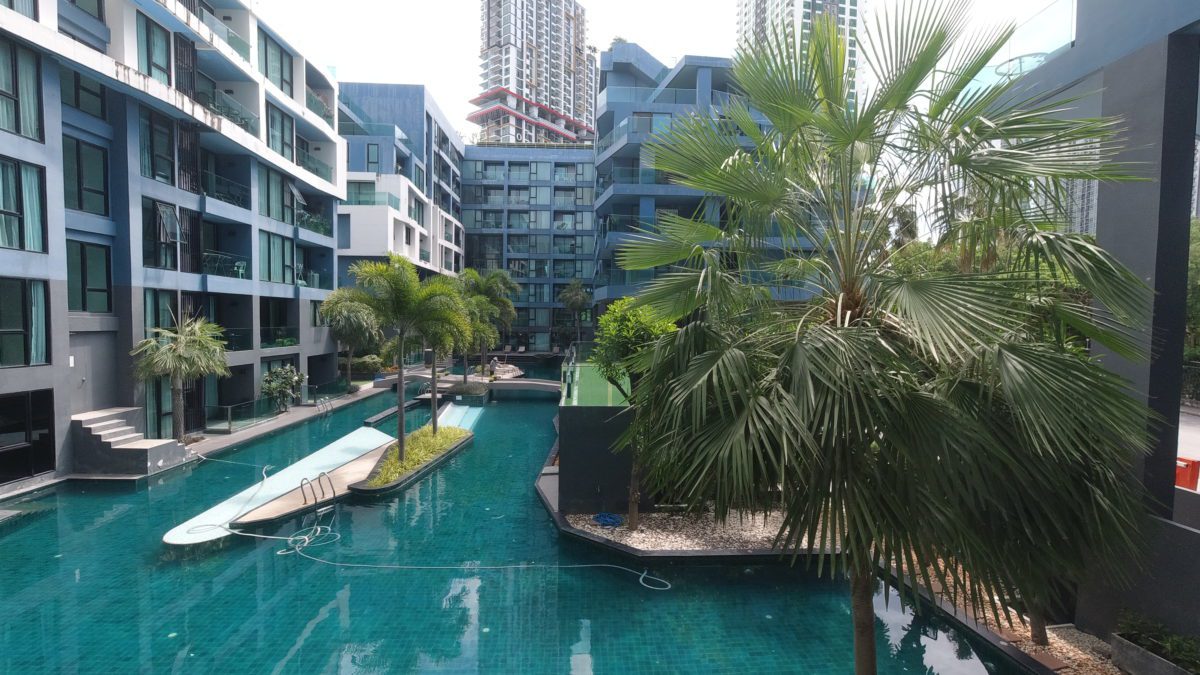
Keeping Living Costs Down with Hobbies
I feel that to keep living expenses down you need hobbies. Having a hobby that you enjoy, can help to stop boredom and can be a great way to make friends. I personally am learning to play the guitar and enjoy retro gaming of old PlayStation games on my PC.
Other basic things I enjoy are a good walk along the beach, cooking, cycling, and chilling out with friends over a beer.
For hobbies such as these, once you have the equipment, such as a musical instrument or a laptop, the costs are pretty much next to nothing.
Utility Bills
So you can see that I’ve pretty much got my Apartment, exercise facilities, and hobbies covered for 7,500 THB.
My next major expense is utilities, namely water and electricity. These cost me from 700 to 1500 THB per month, depending on the season. Let’s be safe, and call it an average of 1300 THB a month (it’s probably closer to 1,000 tbh). So about $37 a month.
Other key Bills
I have a mobile phone plan with AIS. This costs me 200 THB per month for unlimited data. At about a 10 MBPS download speed.
I also have a 3BB 1 gig down internet connection, which costs me 649 THB a month (on a year-long contract). This package from 3BB also includes a subscription to HBO.
Further to this, I have a yearly subscription to Disney plus (via an AIS promotion) for 500 THB per year, or about 40 THB per month.
I own a scooter, and put about 250 THB of fuel a month into it. This is good for 300 KM or so (yeah Honda scooters are super efficient). Add two thousand baht a year for servicing, and we are looking at about 420 THB a month for my motorcycle transport costs.
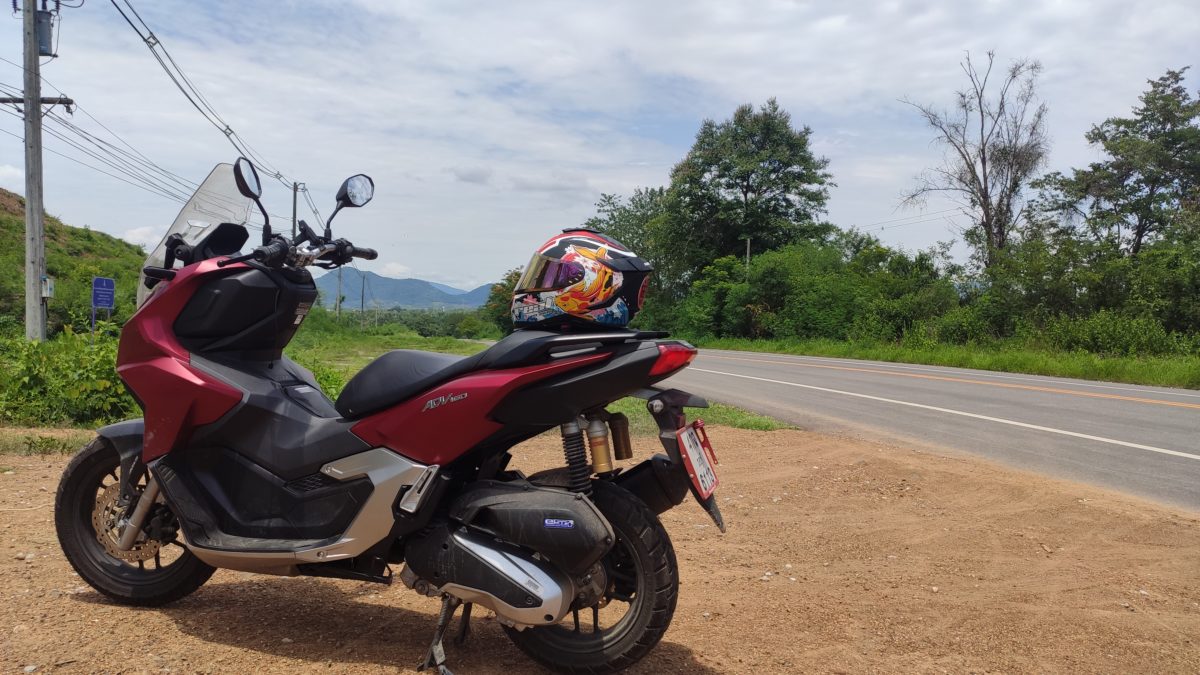
My Thai retirement visa extension costs a further 1,900 baht a year ($54).
Here is a summary of my main non-food living expenses.
7500 for the apartment, 1300 baht for utilities, 400 THB to run the bike, 650 baht for 3BB internet and HBO, 200 baht for AIS mobile, and a further 40 baht for Disney+. This comes to about 10,300 THB or about 286 USD.
Food and Lifestyle Expenses
So, from my $750 monthly allowance (26,500 THB), I am left with about 16,400 THB or $463, once my core non-lifestyle costs have been covered.
If I take 1,200 THB out of this for monthly shopping for goods such as shampoo, cleaning products, spices, and the like. And a further 200 baht a month to cover my yearly visa extension (as I forgot to subtract it before), then I am left with 15,000 THB or 500 THB a day to live on.
Let’s move on to some of my typical daily living expenses.
In most countries, an easy way to keep costs down is to cook for yourself. This is not necessarily true in Thailand, as it is often much cheaper to eat out than it is to cook for yourself.
I usually start the day with a walk along the beach promenade, and I’ll grab a coffee at a café for 40 to 50 THB.
Next up is a bit of food. like to cook my own breakfast and here are a few typical dishes and their costs.
- Four egg omelette, side of spinach = 50 THB
- Baked Beans on Toast = 40 THB
- Scrambled eggs on Toast = 40 THB
- Yoghurt and Blackcurrants = 50 THB
- Oats and Banana = 30 Baht
- Cumberland Sausages, eggs, and Tomatoes = 75 THB
This leaves me with about 400 THB for the rest of the day.
As I mentioned before, it is cheap to eat out in Thailand. I can go to a local food court or restaurant and eat local Thai foods such as Duck noodle soup, Panang Curry, Chicken Cashew nuts, and the like, for about 50 to 70 THB ($1.5 to $2).
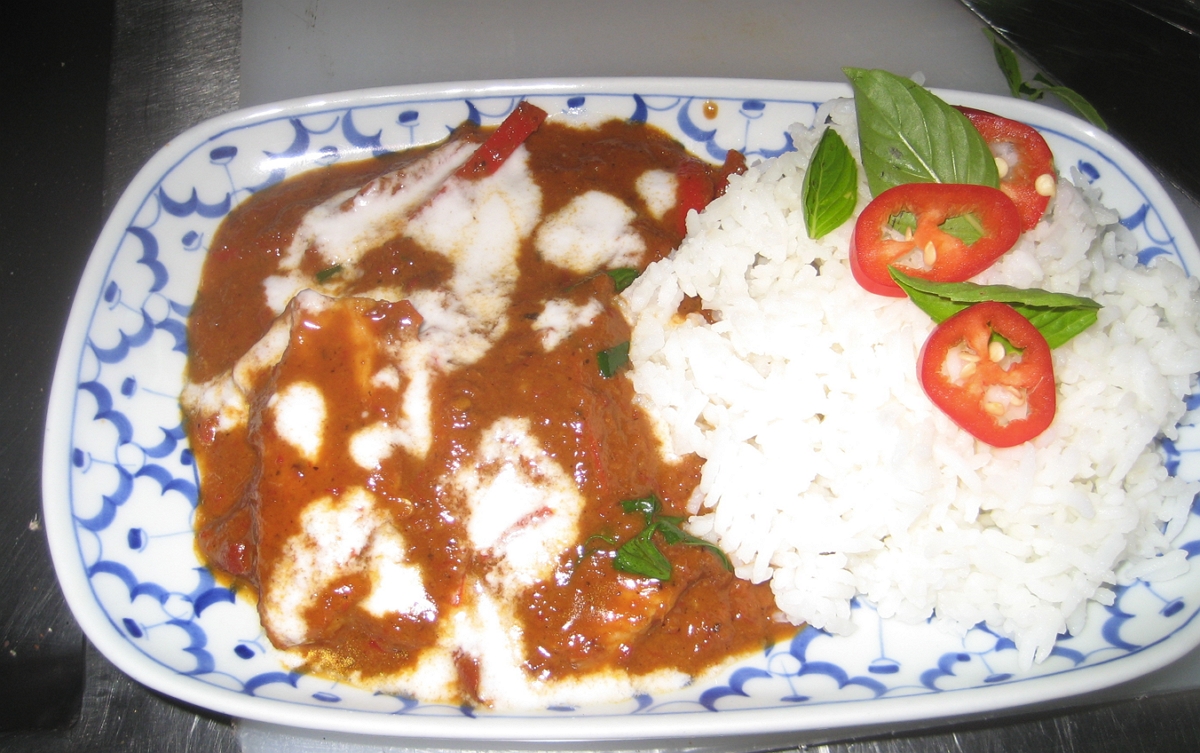
If I want non-Thai food, then I mostly cook it myself at home, taking advantage of the cheap prices of fruit and vegetables.
I guess that I am looking at spending about 250 THB ($7) a day for my three main meals and morning coffee.
Add in another 100 baht ($2.85) or so for snacks, such as Gyoza, Makado, Pocky, Soda, Rice Crackers, Onigiri, Oreos etc., from 7-11, then I’d have spent about 350 THB ($10) for the day, from my 500 THB ($14.22) allowance, and will have 150 THB ($4.27) spare.
I do like a drink or two, but not every day. I definitely want to include things like this in the $750 core Thai living expenses.
So, let’s go back to looking at things on a monthly basis. 150 THB spare a day, is about 4,500 baht ($128) a month.
This is good for a few nights out for a beer (~70 thb ($2) a bottle), eating out at a nicer restaurant every now and again, and a bit of shopping from Lazada, or at the Mall in shops such as Uniqlo and Decathlon.
$750 Cost of Living Achieved
So for me, living in Thailand for $750 a month is totally doable.
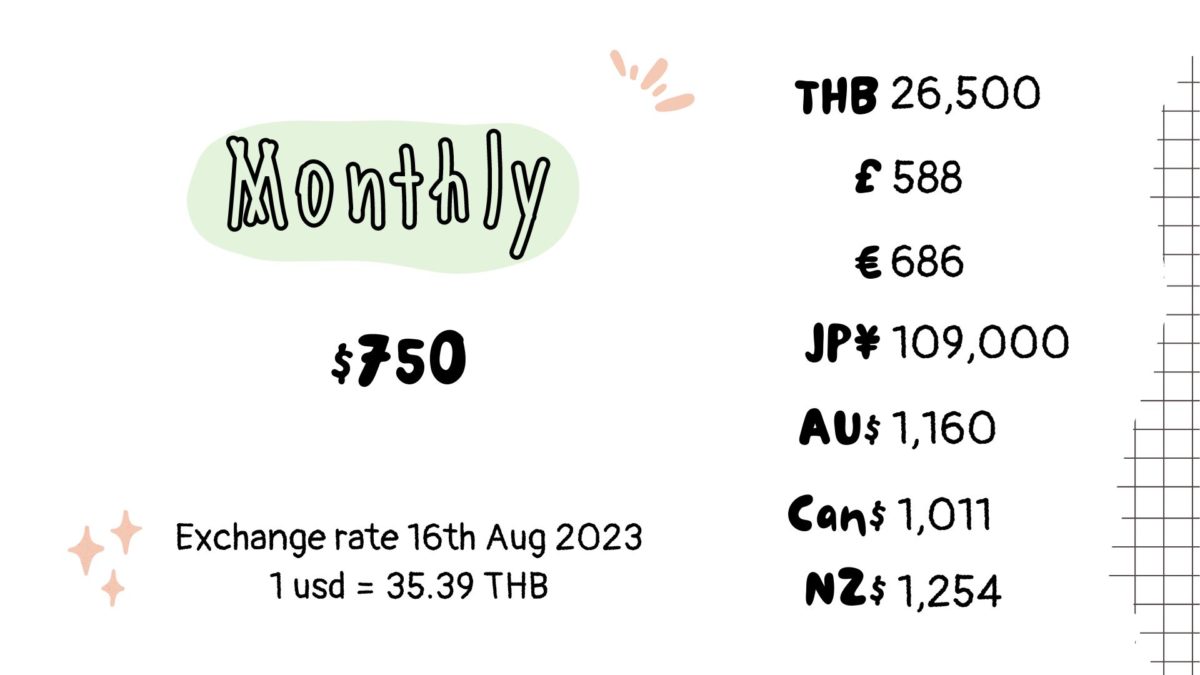
Probably not the most exciting life, but better than struggling to pay the bills through the winter as you try to make your pension last a little longer during these tough times.
But let’s be honest, if you had $1,000 or more a month to spend in Thailand, it’d be much more fun.
Can you survive on a Pension or Social Security Check in Thailand?
As I mentioned at the start, if you are getting the standard British pension (which seems to be one of the lowest), then you’ll be getting over $1,100 a month, Aussie Age Pension is around $1,475 US, NZ Super is about $1270 US per month, and the average US Social security over $1,800.
So if you can keep your main Thailand monthly living expenses down to $750, then a standard UK pension should leave about $370 a month spare (about $4,500 a year), an Aussie pension about $725 ($8,700), NZ super $520 ($6,240), and American social security $1,080 ($12,960).
Thus, most pensions are more than enough to live a good lifestyle in Thailand, with plenty left over to make retirement here more than enjoyable.
Obviously, some pensions are more equal than others, and if you have a private pension on top of the one your govt. provides, then it can definitely make a difference in one’s quality of life.
Although I have largely focussed on people retiring here, the same holds true for others wishing to live long-term in Thailand.
For example, if a Digital nomad is able to save up about $12,000 before making a trip out to Southeast Asia, then they should easily have a good 12 months of runway cash, enabling them to get their business off the ground.
A Few Further Thoughts on Living Expenses for a Long-Term Stay in Thailand
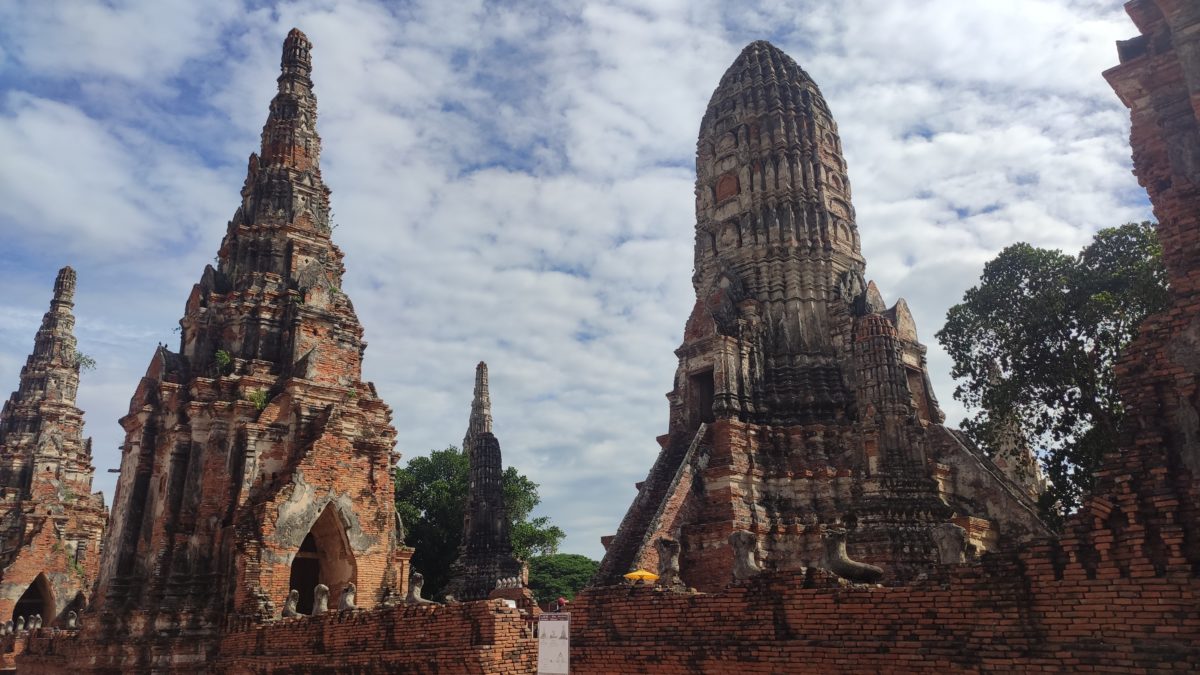
Although it is more than possible to live a pleasant, if somewhat basic, life in Thailand for $750 a month. And believe me, you can live a very good life if you have more than $1,500 a month to spend! I think that it is important to consider some of the many costs required while you are getting settled into your new home in Thailand.
When you first move to Thailand to live long-term, you’ll most likely need to make many one-off payments. This is especially so if you are moving into a non-furnished apartment or bungalow.
Even if you are moving into a furnished home, you’ll need to do an initial stock up at the supermarket, buy odds and ends such as Air fryers, extra costs, and maybe even a monitor and printer for your home office.
Regardless of my core monthly home costs now, I personally splashed out over 100,000 THB on a Honda scooter (though you could hire similar for 4,000 THB a month), and more than 30,000 on my two main hobbies of playing the guitar and videography.
It is important to keep these initial start-up costs in mind when trying to decide if you can really afford to live long-term in Thailand.
I don’t recommend coming over here if you don’t have a little bit of backup cash, to at least cover an emergency trip home and to cover potential medical expenses.
Though accident insurance can be had very cheaply here, I am not going to delve into the topic of Health Insurance at the moment as it is a whole topic in itself.